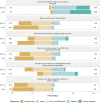Effects of an empowerment program for survivors of sexual violence on attitudes and beliefs: evidence from the Democratic Republic of Congo
- PMID: 31533738
- PMCID: PMC6751604
- DOI: 10.1186/s12939-019-1049-4
Effects of an empowerment program for survivors of sexual violence on attitudes and beliefs: evidence from the Democratic Republic of Congo
Abstract
Background: Women's empowerment may require women to change their beliefs and views about their rights and capabilities. Empowerment programs often target women who have survived sexual and gender-based violence (SGBV), with the justification that these women may develop disempowered beliefs as a coping mechanism, or face greater barriers to, or derive greater benefits from, the adoption of empowered beliefs and preferences. We investigated an intensive, six-month residential empowerment program ("City of Joy") for SGBV survivors in eastern Democratic Republic of the Congo (DRC), where more than one in five women have experienced SGBV.
Methods: We asked 175 participants about their beliefs and preferences pertaining to political, financial, and domestic empowerment. Interviews took place immediately before and after participation in the program, and we tested for differences in views of empowerment between entry and exit using paired t-tests and McNemar's test. We also conducted 50 semi-structured interviews about empowerment with an additional 30 women who had completed the program up to 5 years earlier and then returned to their home community.
Results: Prior to enrolling in the program, participants had fairly empowered views regarding politics, less empowered views regarding finances, and still less empowered views regarding the domestic sphere. After completing the program, participants had significantly more empowered views in all three domains, particularly regarding domestic violence, how families should treat men and women, and women's economic rights. Participants in their home communities reported taking a more active role in community affairs and speaking out against the mistreatment of women.
Conclusion: This study adds to the evidence that women's empowerment programs can change participants' beliefs and thus increase the confidence with which they participate in their communities and support one another.
Keywords: Attitude; Belief; Democratic Republic of Congo; Empowerment; Gender; Sexual and gender based violence.
Conflict of interest statement
We wish to draw the attention of the Editor to the following facts which may be considered as potential conflicts of interest. PRIO’s local partner for the research project, the International Center for Advanced Research and Training (ICART) in Bukavu, DRC, has Panzi Foundation DRC as one of its founding partners. Panzi Foundation DRC is also a co-founder of the program under study, City of Joy (the other co-founder being the V-Day Organization). Furthermore, one of the authors of the study, Christine Amisi, also holds a position as a medical doctor at Panzi Hospital, which is the hospital which initiated Panzi Foundation DRC. By nature, since this project is a partnership between PRIO and the International Centre for Advanced Research and Training (ICART) which includes researchers associated with implementing agencies (Panzi Hospital and Panzi Foundation) we cannot guarantee independence of research with complete certainty. However, the researchers involved in the project have never been employed by and are not financially relying on the City of Joy program, or directly affiliated with them. The research partners at ICART have a sincere wish to conduct scientifically sound research in order to inform future project development and to improve various existing support programs. Through regular project meetings and quality control measures in various stages of the research process, we have assured data reliability and analytical rigor.
Figures






Similar articles
-
The impact of support programmes for survivors of sexual violence: micro-level evidence from eastern Democratic Republic of the Congo.Med Confl Surviv. 2018 Sep;34(3):201-223. doi: 10.1080/13623699.2018.1541625. Epub 2018 Nov 7. Med Confl Surviv. 2018. PMID: 30403879
-
A mixed-methods assessment of sexual and gender-based violence in eastern Democratic Republic of Congo to inform national and international strategy implementation.Int J Health Plann Manage. 2013 Jul-Sep;28(3):e188-216. doi: 10.1002/hpm.2144. Epub 2012 Oct 29. Int J Health Plann Manage. 2013. PMID: 23108942
-
Impact of a complex gender-transformative intervention on maternal and child health outcomes in the eastern Democratic Republic of Congo: protocol of a longitudinal parallel mixed-methods study.BMC Public Health. 2020 Jan 14;20(1):51. doi: 10.1186/s12889-019-8084-3. BMC Public Health. 2020. PMID: 31937267 Free PMC article. Clinical Trial.
-
Sexual and gender based violence against men in the Democratic Republic of Congo: effects on survivors, their families and the community.Med Confl Surviv. 2011 Oct-Dec;27(4):227-46. doi: 10.1080/13623699.2011.645144. Med Confl Surviv. 2011. PMID: 22416570
-
Empowerment and programs designed to address domestic violence.Violence Against Women. 2008 Dec;14(12):1465-75. doi: 10.1177/1077801208325188. Violence Against Women. 2008. PMID: 19008548 Review.
Cited by
-
Research on the promoting effect of servitization on export technological sophistication of manufacturing enterprises.PLoS One. 2021 Aug 31;16(8):e0255891. doi: 10.1371/journal.pone.0255891. eCollection 2021. PLoS One. 2021. PMID: 34464422 Free PMC article.
References
-
- García-Moreno C, Pallitto C, Devries K, Stöckl H, Watts C, Abrahams N. Global and regional estimates of violence against women: prevalence and health effects of intimate partner violence and non-partner sexual violence. Geneva: World Health Organization; 2013.
-
- Alesina A, Brioschi B, Ferrara EL. Violence against women: a cross-cultural analysis for Africa. Cambridge: National Bureau for Economic Research (NBER); 2016.

